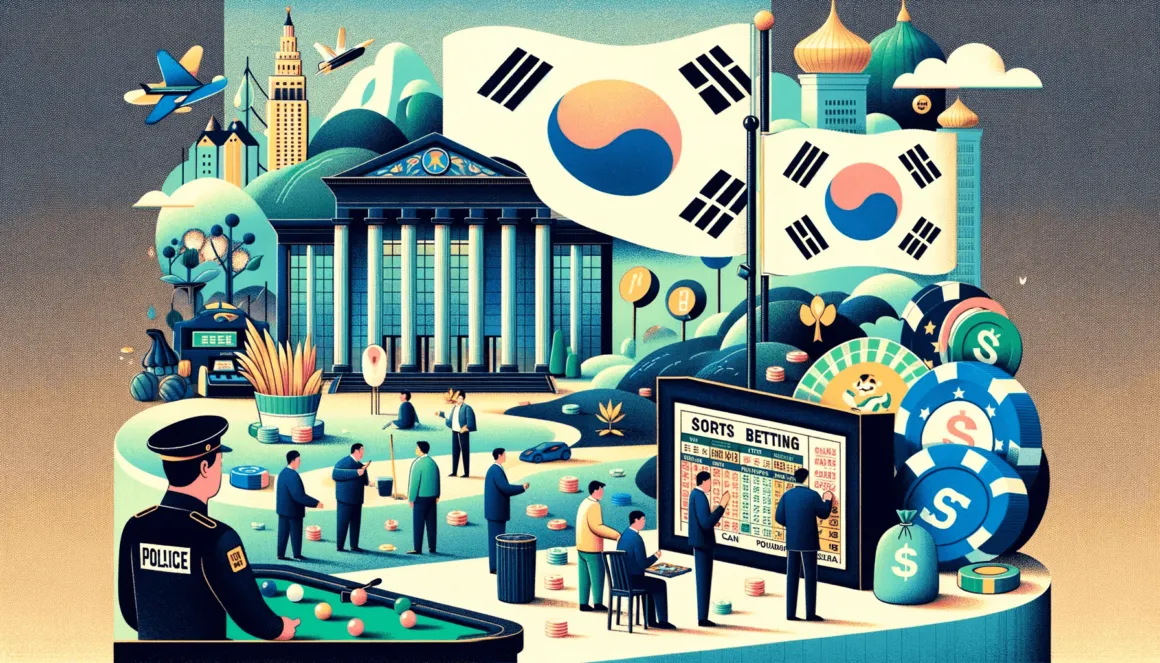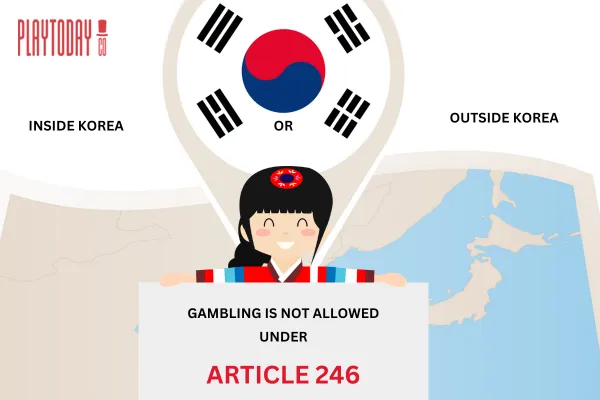The Evolving Legal Landscape of Gambling in Korea
Korea is a country known for its rich cultural heritage, delicious food, and bustling cities. It is also home to a growing gambling industry, with various forms of betting and gaming popular among its citizens. However, the legality of gambling in Korea is a complex and constantly evolving issue. In this article, we will delve into the laws and regulations surrounding gambling in Korea, examining how they have evolved over the years and what the current state of play is.

History of Gambling Laws in Korea
Early Forms of Gambling
Gambling has been a part of Korean society for centuries, with early forms of betting and gaming dating back to the ancient dynasties. These activities were primarily fueled by the desire for entertainment and socialization rather than monetary gain. Traditional games such as board games, card games, and even cockfighting were widely enjoyed among the people.
However, as Korea transitioned into a Confucian society in the late Joseon dynasty, gambling came to be viewed as a negative influence that goes against the moral values of hard work and frugality. As such, stricter regulations were put in place to control and limit gambling activities.
Influence of Confucianism
Confucianism, a philosophical and ethical system with roots in ancient China, had a significant impact on the development of Korea’s gambling laws. The teachings of Confucius emphasized the importance of social order and moral virtues, which were seen as incompatible with gambling. As a result, gambling was heavily regulated, and those caught engaging in it were subject to strict punishments.
The influence of Confucianism can still be seen in the prevailing attitudes towards gambling in Korea today, where the activity is often perceived as a societal evil rather than a form of entertainment.
Japanese Occupation and Post-War Era
The early 20th century saw Korea being colonized by Japan, leading to significant changes in its legal system, including the laws surrounding gambling. Under Japanese rule, gambling was strictly prohibited, with harsh penalties imposed on those who violated the ban.
After Korea’s liberation from Japan in 1945, the country faced political instability, which further shaped its gambling laws. The newly established government saw gambling as a source of revenue and legalized certain forms, such as horse racing and lotteries, to generate funds for economic development.
Current State of Gambling Laws in Korea
Legal Forms of Gambling
Currently, there are only a few legal forms of gambling in Korea, which are regulated and supervised by the government. These include lottery games, sports betting, horse racing, and bullfighting.
The Korean lottery, known as “Korea Lotto,” is operated by the government and offers various forms of lotto games, including the traditional six-number game, Powerball, and Toto. Sports betting, on the other hand, is offered by two government-run organizations, Sports Toto and Proto, which allow betting on various international sports events.
Horse racing is another popular form of gambling in Korea, with three racecourses operating throughout the country. The races are organized by the Korean Racing Authority and attract a significant number of spectators and bettors.
Lastly, bullfighting, which is considered a traditional sport in Korea, is also a legal form of gambling. However, it is only allowed in designated areas and under strict regulations.
Illegal Forms of Gambling
Despite the limited legal forms of gambling, illegal gambling activities still exist in Korea. This includes unauthorized online gambling sites, underground casinos, and private card games. These activities are often organized by criminal groups and pose significant challenges for law enforcement.
Online gambling, in particular, has seen a rise in popularity due to its easy accessibility and anonymity. While the government has attempted to regulate and block these sites, new ones continue to emerge, making it difficult to completely eradicate them.
Impact of Online Gambling
The rise of online gambling has had a significant impact on the gambling industry in Korea. With technological advancements, people can now engage in various forms of gambling, such as casino games and virtual sports betting, from the comfort of their homes.
However, this has also brought about concerns over problem gambling and illegal activities. Online gambling has made it easier for individuals to conceal their gambling habits, leading to an increase in addiction rates. It has also opened up opportunities for money laundering and other criminal activities.
Enforcement of Gambling Laws in Korea

Government Agencies Responsible for Enforcement
The responsibility for enforcing gambling laws in Korea falls under several government agencies, including the police, prosecution, and the Ministry of Culture, Sports, and Tourism (MCST). Each agency has its specific role in regulating and monitoring gambling activities in the country.
The police are responsible for investigating and cracking down on illegal gambling activities, while the prosecution is in charge of prosecuting and punishing those who violate the laws. The MCST oversees the legal forms of gambling, issuing licenses and implementing regulations to ensure fair play and prevent addiction.
Punishments for Illegal Gambling Activities
The punishments for engaging in illegal gambling in Korea can range from fines to imprisonment, depending on the severity of the offense. The maximum penalty for operating an unauthorized gambling site is seven years in prison or a fine of up to 70 million won (around $62,000 USD).
Individuals caught participating in illegal gambling activities can also face fines and imprisonment, with the maximum penalty being five years in prison or a fine of up to 30 million won (around $26,000 USD).
Challenges in Enforcement
Despite the government’s efforts to enforce gambling laws, there are several challenges that hinder their success. One major issue is the existence of underground gambling networks that operate outside of the law and are difficult to track and shut down.
Additionally, the rise of online gambling has made it challenging to enforce laws against unauthorized sites. As mentioned earlier, new sites continue to emerge, making it challenging for authorities to keep up and shut them down effectively.
Social and Cultural Perspectives on Gambling in Korea

Attitudes towards Gambling
As mentioned earlier, gambling is often viewed as a negative influence in Korean society, placing it in stark contrast to countries like the United States, where it is more socially acceptable. The stigma surrounding gambling has led to many people hiding their participation in legal forms of gambling, such as the lottery, out of fear of judgment.
However, attitudes towards gambling have been slowly changing over the years, with younger generations being more accepting of it as a form of entertainment. This is reflected in the growing popularity of online gambling among young adults in Korea.
Gambling Addiction and Treatment Options
As with any form of gambling, addiction is a significant concern in Korea. According to a 2019 survey, around 1 in 20 adults in the country are believed to have a gambling problem. This has led to the government implementing various measures to prevent and treat gambling addiction.
One of these measures is the establishment of the National Center for Gaming Disorders, which offers counseling and treatment programs for gambling addiction. Additionally, all legal gambling sites are required to include responsible gambling features, such as self-exclusion options, to help individuals control their gambling habits.
Comparison with Other Countries
Similarities and Differences in Gambling Laws
Korea’s gambling laws share many similarities with other Asian countries, such as Japan and China, where gambling is heavily regulated or completely banned. In contrast, countries like the United States and Australia have more relaxed regulations on gambling, allowing for various forms, including casinos and online betting.
However, within Asia, there are also significant differences in gambling laws and attitudes towards the activity. For example, while horse racing is a popular form of gambling in Korea, it is illegal in Japan.
Cross-Border Gambling Issues
One notable issue that arises from the differences in gambling laws between countries is cross-border gambling. With the rise of online gambling, individuals can easily access foreign gambling sites and engage in activities that may be illegal in their own country.
This has led to debates over whether countries should work together to regulate and monitor online gambling activities, especially in cases where the sites are based in one country but accessible to players from another.
Future Outlook for Gambling in Korea
Potential Changes in Laws and Regulations
As technology continues to advance, it is likely that the gambling industry in Korea will see further changes in its laws and regulations. One possibility is the legalization of new forms of gambling, such as casinos, to attract more international tourists and boost the economy.
There have also been discussions about regulating online gambling instead of banning it completely. However, this remains a contentious issue, with concerns over the potential negative impact on society.
Impact of International Events and Tourism
With the upcoming 2022 Winter Olympics in Beijing and the 2032 Summer Olympics potentially being hosted by Korea, there is likely to be increased focus on the country’s gambling laws and regulations. International events like these could potentially lead to further changes in laws to accommodate the influx of tourists and stimulate tourism revenue.
Conclusion
In conclusion, the legal landscape of gambling in Korea is a complex and ever-changing one. From its early days as a form of entertainment to its current state as a heavily regulated industry, gambling has played a significant role in Korean society. While there are challenges in enforcing laws and addressing issues such as addiction, it is clear that gambling will continue to shape and evolve in Korea in the years to come.